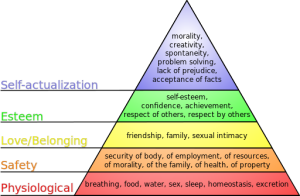There was an interesting article in Techcrunch a couple of days ago reporting on a recent talk by philosopher Alain de Botton. In essence, he was criticising the current trend of businesses that are being formed to solve little more than lightweight “nonsense” issues, whilst the more fundamental pyschological needs of humans are being, for the most part, ignored by startup circles.
There’s no doubt that in the modern age, businesses are becoming increasingly adept at “marketing” – in the sense of becoming more skilled at using technology to get their message in front of as many eyeballs as possible. I often wonder whether that more aggressive method of personalised tracking by digital methods is adding true long-term value for the most part however. It’s one thing convincing someone that they need to buy a good or service, but if the product itself is not then truly valuable to the end user, is the business actually helping to grow the economy in any meaningful sense?
De Botton postulates that Facebook has been so overwhelmingly successful because it focused on a massively underserved area of online business, namely mankind’s fundamental need for better relationships. As he points out, that is not to say that they are doing this well. But even if they fail to deliver perfection on that front, they are selling us something that we are fundamentally seeking – not something that we merely desire.
In terms of the bigger picture, they’re not taking the easier route of simply focusing on clever ways to sell us things that we don’t need. That to me echoes the point that I’ve heard in a couple of talks by Sherry Coutu when she warned of the importance of making sure with a startup that you choose a big enough problem to solve.
He brings the argument back to Maslow’s famous hierarchy of needs and also points to the research a few years ago which showed (to simplify) that human happiness peaks once you start to earn around $36,000 – partly because your aspirations rise in line with higher GDP levels as you struggle to keep up with the Joneses.

The point here is that the opportunity for new businesses to focus on the needs that live further up Maslow’s hierarchy of needs is huge – in part because very few companies are working in that sort of space (as yet). Instead, most are scrabbling around the far more competitive lower levels. Secondly, it makes sense because the goods or services that are produced with these goals in mind have a globally significant market size to target given the fact that they involve an fundamental essence of human character.
It’s an interesting lens to look at new businesses through now we’re at the stage whereby businesses of scale can be built with less money in ever-shorter timescales. If you’re interested, Steve Rosenbaum used the hierarchy of needs to compare Silicon Valley with Silicon Alley in 2011 and Sameer Iyengar wrote an interesting article on how startups cater to our inner motivations.
So if you’re thinking of starting a company, de Botton advises that you look at what really makes people happy. Or, to put it another way, “every bit of human unhappiness is a business waiting to be born”. He also argues that unemployment is the consequence of “the wrong perception of what should be commercialised”. I’ve not thought of it in those terms before – but I suppose on a very basic level (ignoring such factors as inept execution of business model) has a very real strand of truth that lies within it.

One thought on “Startups, Maslow, Happiness, Unemployment”
Comments are closed.